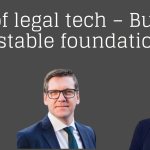NetDocuments today (31 July) announced partnerships with Legora and Harvey through a new partner program called ndConnect.
ndConnect is an interoperability program designed to enable legal professionals to integrate third-party AI solutions into their NetDocuments environment.
At a briefing ahead of this announcement, NetDocuments CEO Josh Baxter said that ndConnect is designed to seamlessly integrate third party AI solutions directly into the NetDocuments platform, commenting: “We know legal professionals are exploring a wide range of AI solutions and we want to make sure that those tools can work directly with their DMS, so we’re partnering with some of the leading companies in the industry to bring forward really high impact value driven use cases use cases that matter to lawyers and other legal professionals to help them to create the maximum value and the best outcomes for their clients.”
Baxter said everything stays securely anchored in the DMS, commenting: ‘I think that is one of the key tenets any programme and that’s one of our first principles that allows full compliance auditability and identity aware security. ndConnect will extend the platform’s capabilities in a few powerful ways: every interaction will respect the user authentication and access controls that are part of the NetDocuments platform, ensuring document level security at all times as people interact with the documents. It’s also built on a really developer friendly architecture meaning customers or partners are going to be able to easily support use cases like transferring documents back and forth which will then grow into much more robust and rich workflows overtime.”
Baxter said that legal professionals are going to be able to act on documents in context, to be able to summarise and analyse them, and do all of those things without compromising any access controls or any content controls.
At the briefing, chief product officer Dan Hauck discussed the potential role of the document management system at the centre of AI workflows, given the right metadata is in place. “What is so important is that this metadata is not only helpful for lawyers to find what they need it’s helpful for AI to find what it needs,” he said. “As we’ve been working on our semantic search capabilities, what we have found is that it’s that bringing together of lexical search, keyword search, metadata and semantic understanding that creates the best outcomes and why likewise, just as a lawyer can filter and find information using this metadata, so can agents, who are crawling across this to find information to power those workflows as well.”
While law firms have been notoriously bad at labelling documents accurately, Hauck said that AI presents an opportunity to fill in that gap and fill in that profile, commenting: “It will say ‘hey this isn’t just a miscellaneous or administrative document, it’s not even just an agreement, it’s a cell tower lease agreement with all of this information baked into it’ or ‘this isn’t just a pleading but this is a motion for summary judgement and here’s all of the information that we want to populate alongside the document.’ Historically firms have either ignored this or they’ve paid individuals to review every single document and manually input that information, which often lags days or weeks behind and it’s incredibly expensive to do this. We’re focused on making this possible for every single document that comes into NetDocuments.”
By partnering with Legora and Harvey, NetDocuments said it aims to deliver high-impact, value-driven use cases for shared customers.
“The ndConnect program will allow us to securely and efficiently connect our firm’s document collection — already managed within NetDocuments’ trusted platform — with generative AI tools like Harvey and other emerging technologies. This kind of innovation and integration helps us get even more value from our technology investments,” said Harris Tilevitz, chief artificial intelligence and technology officer at Skadden, Arps, Slate, Meagher & Flom LLP.
Baxter said he was recently with a group of Am Law 100 CIOs and commented: “Users within the practise of law are asking themselves ‘how can we harness the knowledge that is in our DMS to power the work of the future?’ Let’s be clear, the firms that are going to lead us into the next decade won’t be the ones who simply choose to upgrade what they currently have, they’ll be the ones who are reimagining how work gets done and who even reimagine who they do that work with and who they partner with.
“This moment is more than just about technology, it’s about how firms define the role of content, knowledge, and governance and as part of their strategy clients are demanding more transparency, tighter security, and faster turnarounds than ever before.”
To learn more click here.









